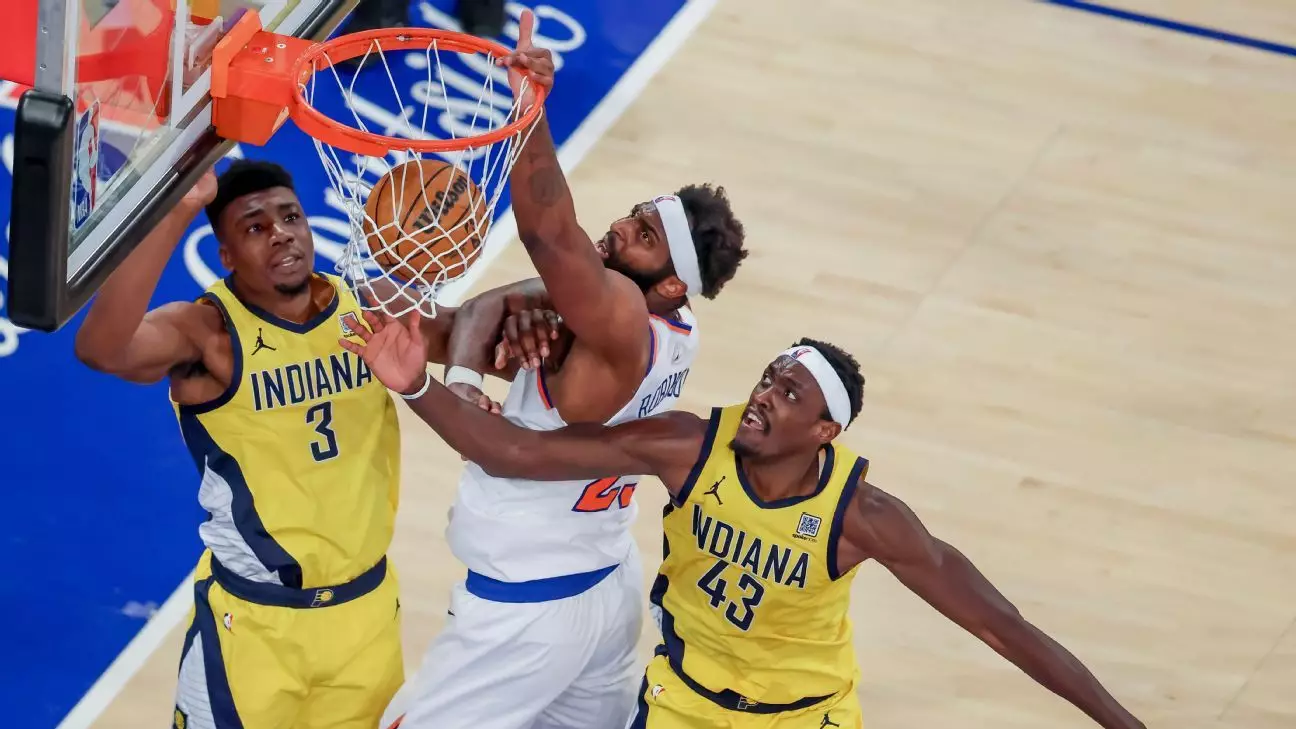In a stark display of vulnerability, the Indiana Pacers showcased their most abysmal offensive performance of the postseason, succumbing to a 111-94 defeat against the New York Knicks. Missing a chance to stomp the series into submission, the Pacers left fans and analysts alike reeling. While star guard Tyrese Haliburton attempted to ease the tension by promoting a narrative of resilience, the stark reality of their performance begs deeper scrutiny. The question emerges: is this confidence grounded in reality or mere complacency masked as poise?
What stood out in Game 5 was not just the scoreline but the disheartening statistics: a meager combined 37 points from their starting five, resulting in a challenging second half where Indiana appeared to have lost any semblance of rhythm. The metrics reveal much; 20 turnovers illuminated not only poor decision-making but a glaring lack of composure under pressure—a critical nuance for any playoff-bound team. Could this loss be an indicator of a deeper issue, one that the players are unwilling to confront?
A Fractured Identity
Pacers head coach Rick Carlisle’s sentiments about “not having the right level of force” and “attitude” suggest a team struggling to redefine its identity in the playoffs. In a league that rewards aggression, adaptability, and a relentless drive, Indiana appeared stagnant. It’s concerning when a team who has a rich history of resilience at such pivotal junctures opts for a dismissive stance instead—a mentality that may cost them dearly.
Haliburton’s underwhelming eight-point contribution, despite the weight of expectation on his shoulders as a leader, further complicates this narrative. His admission that he “got to be better” is a welcome acknowledgment but raises essential questions about the support structure around him. Is this a fleeting bout of poor performance or a warning sign of a systemic issue within the squad? In a pivotal series, every player must not only perform but elevate their game collectively, something that was glaringly absent in this game.
Assessing the Competition
While the Pacers wallowed in their struggles, the Knicks capitalized on their moment of weakness with the aggressive tenacity of a team that understood the stakes. The Knicks didn’t just show up; they delivered a masterclass in playoff mentality, asserting dominance from the get-go. The Pacers were merely shadows, failing to correspondingly elevate their energy or aggression. Leadership on the court relies on the performance of its stars and the execution by their supporting cast; neither were satisfactorily met on this night.
What adds insult to injury is the fact that Game 5 represented a must-win for New York. Faced with the prospect of elimination, their ability to rise to the occasion while the Pacers faltered exposes a concerning chink in Indiana’s armor. Will the Pacers exit the playoffs as an underdog or transform into a force to be reckoned with? It is an ongoing dilemma they must address—one rooted not only in skill but in psychological endurance and adaptability.
The Road Ahead: A Delicate Balance
Looking toward Game 6, the Pacers must cling tightly to their 3-2 series lead while wresting back confidence. The notion that “you sometimes have to lose to get better” reflects a naïve comfort in moments of defeat. Instead, they must reclaim the fire from their recent successes, a task that demands ferocity, discipline, and an unwavering focus on self-improvement.
The task is clear: the Pacers must embrace the lessons of Game 5 whilst orchestrating a response that showcases their character. Will they choose resilience or will they falter under the weight of expectations? For a team eager to advance and shed its previous playoff shortcomings, this is a critical test—one that goes beyond mere numbers and into the very heart of what it means to grow through adversity. The stakes are higher now; the Pacers must decide how to redefine their narrative not only for this series but for their identity as a franchise in the making.

Leave a Reply